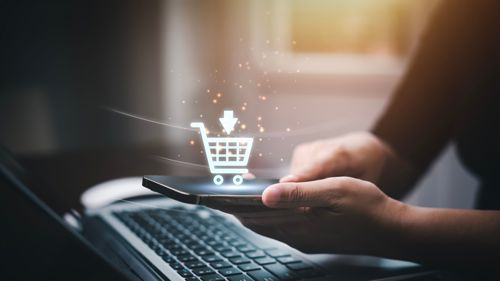The Distillery #5: Vodafone-led Partnership to Launch Pay by Bank in Germany

In this edition:
- Vodafone is launching Pay by Bank in Germany — here’s why it could transform mobile payments.
- mPOS and Soft POS are booming — here's three trends set to drive vendor success in 2025.
- US EV incentives hit the brakes — what recent policy shifts mean for the future of the clean vehicle market.
- Our latest insights on Klarna, OTP revenues, Capital One x Discover, and mobile ARPU.
TELECOMS & CONNECTIVITY
Vodafone Partners with Tink & Ayden for Pay by Bank in Germany

Vodafone just teamed up with Tink, a subsidiary of Visa, and Ayden to roll out a Pay by Bank feature for mobile users in Germany. Instead of using card details, subscribers can pay directly from their bank account for digital purchases; a process powered by Open Banking.
Crucially, these payments won’t be processed like regular card transactions. Strong Customer Authentication (SCA) will apply, likely using MFA tools like one-time passwords sent via text or mobile network APIs.
Distilled...
🟣 Open Banking always refers to the most up-to-date payment information, providing greater protection against fraud. By implementing these disruptive payment channels, network operators such as Vodafone can better position themselves as leading digital players beyond traditional connectivity services.
🟣 Pay by Bank offers a serious upgrade from Direct Carrier Billing (DCB), which has long been operators’ go-to for mobile payments. DCB is clunky by comparison — and doesn’t offer the same fraud protections or user control.
🟣 Our latest data has DCB facilitating $7 billion worth of transactions in Germany this year; a substantial volume that brings equally substantial transaction fees. By shifting users to Pay by Bank, which involves fewer intermediaries, operators like Vodafone can cut those costs and capture more value.
FINTECH & PAYMENTS
Insider: mPOS & Soft POS Trends to Watch in 2025

Mobile and software-based POS solutions aren’t just replacing traditional terminals; they’re transforming how merchants operate, compete, and scale. To celebrate the release of our latest research on the subject, here’s an exclusive look at three trends driving this evolution — and shaping POS vendors' strategies.
🟣 Apple’s move to open up third-party apps is a game-changer for Soft POS. By breaking down previous barriers, it’s unlocking a wider ecosystem of Soft POS solutions, sparking fierce competition and a wave of innovation across the industry.
🟣 Merchant demand is soaring, pushing POS providers to scale with modular, customisable features. The winners will be those investing early in smart integrations - think AI-powered inventory management, CRM, and analytics - offering merchants tailored solutions and valuable upsell opportunities.
🟣 Growth is accelerating in emerging regions like the Indian Subcontinent and Asia Pacific, where SMEs are the biggest adopters of mPOS and Soft POS. This expansion is fuelled by rising smartphone use, financial inclusion initiatives, and government pushes toward cashless economies.
SUSTAINABILITY & SMART CITIES
US EV Market Takes a Hit as GOP Cuts Incentives & Standards

Last week, House Republicans passed the “One Big Beautiful Bill Act,” a sweeping tax and spending package that eliminates Biden-era clean energy incentives, including the $7,500 tax credit for new EV purchases. EV owners would also face a new annual $250 tax, while hybrid drivers would pay $100.
At the same time, the US Senate voted to end California’s longstanding right to set its own vehicle emissions standards. This decision could derail the state’s plan to require all-electric new car sales by 2035. With over 15 other states, including New York, Colorado, and Washington, following California’s lead, the impact could be nationwide.
Distilled…
🟣 Scrapping tax credits could hand Chinese EV brands like BYD a bigger foothold in the US. They've seemingly mastered low-cost production, and without the $7,500 credit, price-sensitive US buyers may look abroad. Our data shows that EV ownership in the US grew 46% from 2023 to 2024 — proof, if any were needed, that incentives work.
🟣 The bill’s flat annual tax also increases ownership costs for both new and existing EV and hybrid drivers. Unlike the fuel-based tax paid by internal combustion engine (ICE) vehicle owners, this flat fee applies regardless of how much the vehicle is driven; a method widely regarded by experts as regressive and unfair.
🟣 A single national emissions standard may simplify compliance in the long run, but it comes at a high cost. It undermines California’s historic leadership in clean car policies and risks stalling progress in the country’s largest and most influential vehicle market.
ICYMI
Signal Boost
Every issue, we highlight the research, blogs, infographics, and insights we're especially proud of.
📉 Klarna’s latest losses have sparked rumours that the company is on the verge of collapse. But the truth is (unsurprisingly) more complex than TikTok would have you believe.
🔐 Revenue from one-time passwords (OTPs) sent via OTT messaging apps is set to soar 600% by 2029, as businesses shift from traditional SMS to encrypted channels like WhatsApp and Viber.
💳 Capital One’s acquisition of Discover could spark a major shift in the US payments market. How does this raise the stakes — not just for credit cards, but for the future of how we pay?
📱 And finally, mobile operators live and die by Average Revenue Per User (ARPU). Which countries will deliver the highest returns in 2025 — and what actually influences ARPU?
Latest research, whitepapers & press releases
-
 ReportFebruary 2026Telecoms & ConnectivityMobile Messaging Market: 2026-2030
ReportFebruary 2026Telecoms & ConnectivityMobile Messaging Market: 2026-2030Juniper Research’s Mobile Messaging research suite provides mobile messaging vendors, mobile network operators, and enterprises with intelligence on how to capitalise on changing market dynamics within the mobile messaging market.
VIEW -
 ReportFebruary 2026Fintech & PaymentsKYC/KYB Systems Market: 2026-2030
ReportFebruary 2026Fintech & PaymentsKYC/KYB Systems Market: 2026-2030Our KYC/KYB Systems research suite provides a detailed and insightful analysis of an evolving market; enabling stakeholders such as financial institutions, eCommerce platforms, regulatory agencies and technology vendors to understand future growth, key trends and the competitive environment.
VIEW -
 ReportFebruary 2026Telecoms & ConnectivityRCS for Business: 2026-2030
ReportFebruary 2026Telecoms & ConnectivityRCS for Business: 2026-2030Our comprehensive RCS for Business research suite provides an in‑depth evaluation of a market poised for rapid expansion over the next five years. It equips stakeholders with clear insight into the most significant opportunities emerging over the next two years.
VIEW -
 ReportFebruary 2026Fintech & PaymentsMobile Money in Emerging Markets: 2026-2030
ReportFebruary 2026Fintech & PaymentsMobile Money in Emerging Markets: 2026-2030Our Mobile Money in Emerging Markets research report provides detailed evaluation and analysis of the ways in which the mobile financial services space is evolving and developing.
VIEW -
 ReportJanuary 2026IoT & Emerging TechnologyPost-quantum Cryptography Market: 2026-2035
ReportJanuary 2026IoT & Emerging TechnologyPost-quantum Cryptography Market: 2026-2035Juniper Research’s Post-quantum Cryptography (PQC) research suite provides a comprehensive and insightful analysis of this market; enabling stakeholders, including PQC-enabled platform providers, specialists, cybersecurity consultancies, and many others, to understand future growth, key trends, and the competitive environment.
VIEW -
 ReportJanuary 2026Telecoms & ConnectivityMVNO in a Box Market: 2026-2030
ReportJanuary 2026Telecoms & ConnectivityMVNO in a Box Market: 2026-2030Juniper Research’s MVNO in a Box research suite provides Mobile Virtual Network Enablers, Mobile Virtual Network Aggregators, and other players with detailed analysis and strategic recommendations for monetising demand for MVNO in a Box services.
VIEW
-
 WhitepaperFebruary 2026Telecoms & Connectivity
WhitepaperFebruary 2026Telecoms & ConnectivityHow Social Media Will Disrupt Mobile Messaging Channels in 2026
Our complimentary whitepaper, How Social Media Will Disrupt Mobile Messaging Channels in 2026, explores the challenges and opportunities for operators and enterprises as social media traffic continues to increase.
VIEW -
 WhitepaperFebruary 2026Telecoms & Connectivity
WhitepaperFebruary 2026Telecoms & ConnectivityProtecting Users from Scam Ads: A Call for Social Media Platform Accountability
In this new whitepaper commissioned by Revolut, Juniper Research examines how scam advertising has become embedded across major social media platforms, quantifies the scale of user exposure and financial harm, and explains why current detection and enforcement measures are failing to keep pace.
VIEW -
 WhitepaperFebruary 2026Fintech & Payments
WhitepaperFebruary 2026Fintech & PaymentsKnow Your Agents (KYA): The Next Frontier in KYC/KYB Systems
Our complimentary whitepaper, Know Your Agents (KYA): The Next Frontier in KYC/KYB Systems, examines the state of the KYC/KYB systems market; considering the impact of regulatory development, emerging risk factors such as identity enabled fraud, and how identity and business verification is evolving beyond traditional customer and merchant onboarding toward agent-level governance.
VIEW -
 WhitepaperFebruary 2026Telecoms & Connectivity
WhitepaperFebruary 2026Telecoms & Connectivity3 Key Strategies for Capitalising on RCS Growth in 2026
Our complimentary whitepaper, 3 Key Strategies for Capitalising on RCS Growth in 2026, explores key trends shaping the RCS for Business market and outlines how mobile operators and platforms can accelerate adoption and maximise revenue over the next 12 months.
VIEW -
 WhitepaperFebruary 2026Fintech & Payments
WhitepaperFebruary 2026Fintech & PaymentsThe Next Steps for Mobile Money – Interoperability and Openness
Our complimentary whitepaper, The Next Steps for Mobile Money – Interoperability and Openness, analyses how interoperability and open platforms can drive new growth opportunities through partnerships with key stakeholders.
VIEW -
 WhitepaperJanuary 2026IoT & Emerging Technology
WhitepaperJanuary 2026IoT & Emerging TechnologyPreparing for Q-Day: Post-quantum Security Shift
Our complimentary whitepaper, Preparing for Q-Day: Post-quantum Security Shift, assesses the factors which are increasing interest in adopting PQC, and challenges to PQC adoption. Additionally, it includes a forecast summary of the global spend on PQC by 2035.
VIEW
-
Telecoms & Connectivity
MVNO Subscriber Revenue to Exceed $50 Billion Globally in 2030
March 2026 -
Fintech & Payments
QUBE Events is excited to bring back the 24th NextGen Payments & RegTech Forum - Switzerland
February 2026 -
Telecoms & Connectivity
OTT Messaging Apps to Exceed 5 Billion Users Globally by 2028; Driving Shift in Enterprise Communication Strategies
February 2026 -
Fintech & Payments
Calling All Fintech & Payment Innovators: Future Digital Awards Now Open for 2026
February 2026 -
Telecoms & Connectivity
Operator RCS for Business Revenue to Reach $3 Billion Globally by 2027, Growing 150% in Two Years
February 2026 -
Fintech & Payments
KYC & KYB Systems Spend Outside Financial Sector to Grow 105% by 2030 Globally, as KYC Moves Beyond Banking
February 2026



















